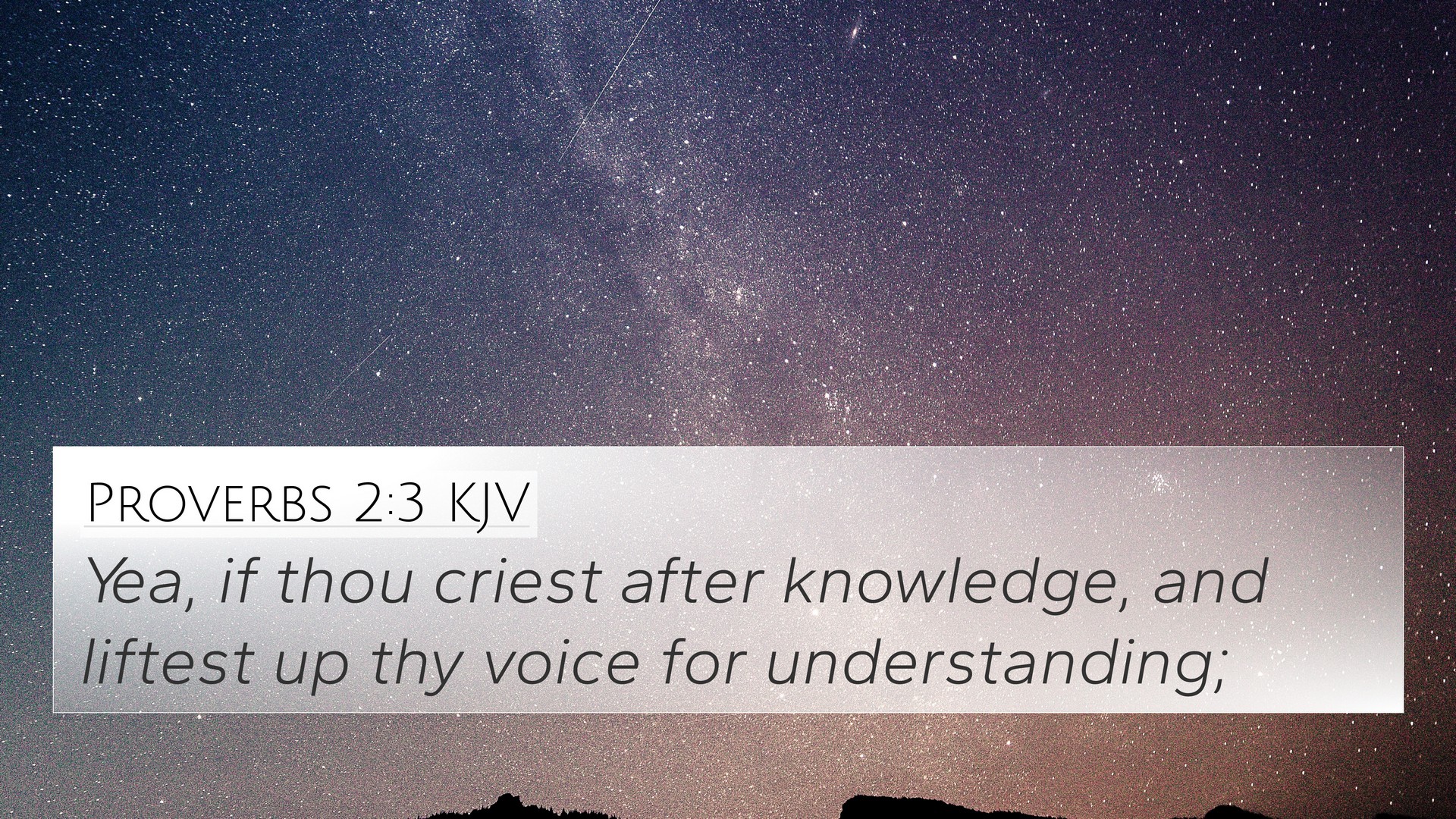Understanding Proverbs 2:3
Proverbs 2:3 states: "Yea, if thou criest after knowledge, and liftest up thy voice for understanding." This verse invites readers to fervently pursue wisdom and understanding, showing the importance of an earnest and passionate pursuit for divine knowledge.
Meaning and Significance
This verse emphasizes the need for intentionality in one's quest for wisdom. It teaches that acquiring knowledge and understanding requires effort, much like a cry for help or a passionate call that seeks the attention of the Divine.
- Intentional Pursuit: The verse suggests that gaining wisdom is not passive; it involves actively seeking and desiring knowledge.
- Vocal Cry: "Cry out" implies an urgent need for understanding, symbolizing a deep yearning for God's guidance.
- Divine Wisdom: This verse aligns with other scriptures emphasizing the value of seeking godly wisdom (James 1:5).
Commentary Insights
According to public domain commentaries:
-
Matthew Henry:
Henry notes the necessity of earnestness in seeking wisdom. He emphasizes that one must "cry out" and actively pursue understanding through prayer and study to be blessed with knowledge from God.
-
Albert Barnes:
Barnes highlights that lifting the voice symbolizes the intensity of seeking knowledge, suggesting that an active expression of desire is vital in the quest for spiritual enlightenment.
-
Adam Clarke:
Clarke elaborates on the importance of both knowledge and understanding, stressing that mere theoretical knowledge is insufficient without practical application and interpretation.
Cross-References for Proverbs 2:3
Proverbs 2:3 can be cross-referenced with various other Bible verses that share similar themes of wisdom and understanding:
- James 1:5: "If any of you lack wisdom, let him ask of God..." - A direct call to seek divine wisdom.
- Proverbs 4:7: "Wisdom is the principal thing; therefore get wisdom..." - The foundation of knowledge is emphasized.
- Proverbs 18:15: "The heart of the prudent getteth knowledge..." - Highlights the importance of a wise heart in acquiring understanding.
- Proverbs 1:7: "The fear of the LORD is the beginning of knowledge..." - Establishes reverent awe as the starting point for wisdom.
- Psalm 111:10: "The fear of the LORD is the beginning of wisdom..." - Reinforces the theological framework of seeking wisdom.
- Colossians 2:3: "In whom are hid all the treasures of wisdom and knowledge." - Highlights that all wisdom is found in Christ.
- Proverbs 3:13: "Happy is the man that findeth wisdom..." - The happiness and blessings associated with the pursuit of wisdom.
Connecting Themes
The verse is part of a larger discourse on wisdom found throughout the book of Proverbs. Each verse builds on the necessity of wisdom in decision-making and living a righteous life.
Tools for Bible Cross-Referencing
Utilizing tools for Bible cross-referencing aids in deepening one’s understanding. Consider these tools:
- Bible concordances to identify similar verses.
- Bible cross-reference guides to link related scriptures.
- Cross-referencing Bible study methods that enhance thematic analysis.
- Bible reference resources for exploring inter-Biblical dialogues.
- Tools to identify connections between Old and New Testament writings.
Practical Application
Ultimately, Proverbs 2:3 serves as a reminder of the necessity and effort required in the pursuit of wisdom. Seekers are encouraged to:
- Pray earnestly for understanding.
- Study diligently to uncover the layers of knowledge within Scripture.
- Engage with others in discussions that challenge and deepen understanding.
Conclusion
The exploration of Proverbs 2:3 highlights the importance of actively seeking wisdom and understanding. By connecting it to related verses and utilizing cross-referencing tools, believers can enrich their journey towards a deeper relationship with God.














